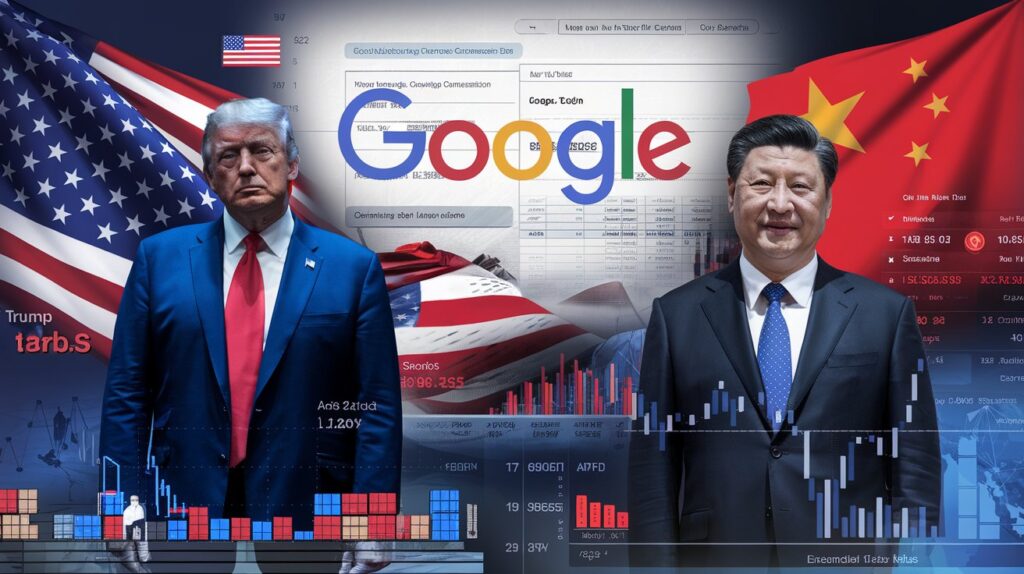This article explores China’s strategic yet measured response to former U.S. President Donald Trump’s tariffs, including targeted economic countermeasures and a symbolic investigation into Google, and analyzes the broader implications for global markets and international trade relations

China’s Strategic Response to Trump’s Tariffs: A Calculated Move in the U.S.-China Trade War
The escalating U.S.-China trade war has seen another chapter unfold with China’s carefully measured retaliation against tariffs imposed by former U.S. President Donald Trump. While some expected a forceful counterstrike, China has instead chosen a restrained yet strategic approach, targeting U.S. energy imports and launching an antitrust probe into Google. This article examines China’s response, its economic and political implications, and what it means for the global market.
China’s Retaliatory Measures: A Balanced Countermove
China’s response to Trump’s tariffs includes a 15% tariff on U.S. energy imports and a 10% tariff on American oil and agricultural equipment. These targeted measures are designed to send a message to Washington while avoiding excessive harm to China’s own economy. Instead of opting for broad, sweeping tariffs, Beijing has chosen a calculated approach that allows it to exert economic pressure while maintaining economic stability.
The Google Antitrust Investigation: Symbolism Over Substance?
China’s decision to launch an antitrust investigation into Google appears to be a symbolic countermeasure rather than a substantial legal action. Given that Google is already banned in China, this move has little direct economic impact. However, it sends a clear political signal: China is willing to challenge American tech giants as part of its broader strategy to counter U.S. economic policies. The investigation may also serve as a warning to other U.S. technology companies operating in global markets.
Stock Market and Economic Impact: A Measured Market Response
Following China’s announcement, stock markets initially reacted with volatility but later stabilized. Analysts believe China’s restrained approach aims to avoid triggering a full-scale economic fallout. U.S. stock futures dipped slightly, while investors remain watchful of how these trade tensions could affect the global energy and technology sectors.
Trade War Dynamics: Trump’s Unpredictable Negotiation Tactics
The Bloomberg segment highlights how Trump’s unpredictable trade policies complicate strategic responses from other nations. Unlike China’s calculated retaliation, Trump has often announced tariffs abruptly, only to backtrack or negotiate exemptions later. Other countries, such as Mexico and Canada, have responded differently—Mexico remained largely silent, while Canada retaliated immediately. Both nations ultimately secured temporary exemptions, showing that negotiation strategies play a crucial role in trade disputes.
Geopolitical Considerations: Domestic and International Signals
China’s response is not only a reaction to U.S. tariffs but also a move to reassure its own citizens that President Xi Jinping is protecting national interests. Meanwhile, China’s ongoing transition to a consumption-driven economy could reduce its reliance on U.S. trade over time, further weakening Washington’s leverage. Additionally, Trump’s decision to temporarily exempt the UK from tariffs appears to be a strategic maneuver to separate the UK from the EU in post-Brexit negotiations.
Long-Term Implications: A Shift in Global Trade Relations?
If trade tensions persist, China may accelerate its efforts to become more self-sufficient, particularly in energy and technology. The antitrust investigation into Google could be a precursor to broader restrictions on U.S. tech companies operating in global markets. Meanwhile, ongoing uncertainty could negatively impact U.S. agriculture and energy sectors, potentially leading to long-term shifts in international trade dynamics.
Conclusion: China’s Strategic Play in a High-Stakes Trade War
China’s response to Trump’s tariffs is measured yet strategic, maintaining a balance between economic pressure and diplomatic restraint. The tariffs on U.S. energy imports and the Google investigation serve as signals of strength without pushing tensions into a full-blown trade war. As global markets adjust to these developments, the next moves from both Beijing and Washington will determine the future trajectory of this complex economic rivalry. The situation remains fluid, with further escalations or de-escalations likely in the coming months.
By analyzing China’s calculated response, we gain insight into the evolving landscape of international trade and geopolitics. As the world watches this trade war unfold, the interplay between economic strategy and political maneuvering will continue to shape global markets and diplomatic relations.


